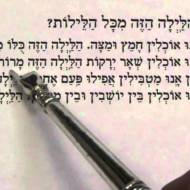
Why are there only four questions in the “Ma Nishtana”? Do we need to spoon-feed the kids on what to ask?
The Seder night is full of oddities and unusual practices. Furthermore, “this night is different” in far more than four ways.
As such, the question is asked: Why are there only four questions in the Ma Nishtana? There would be so many more questions if we were to think up the many ways in which the Seder meal is different from a regular dinner every other night of the year. So, too, the children would surely notice some of these differences and ask questions of their own. Why do we need to spoon-feed the kids on what questions to ask? Or do we?
It is explained that the questions included in the Ma Nishtana are not necessarily questions that we would expect the children to ask, and more important, they are not issues we would expect the children to compare and contrast. Indeed, the goal of the Ma Nishtana is not necessarily to raise all the possible questions and differences of the evening, but rather to independently present the two primary themes of the seder: slavery and freedom. In other words, the purpose is to exercise our emotions, not our intellect. Let’s see:
The first two questions deal with the symbols of slavery, the matzoh and the maror (bitter herbs), while the next two deal with symbols of freedom – dipping vegetables and reclining. These four questions are intended to arouse within us — all the participants at the Seder— a feeling of appreciation for what God has done for us. Beginning the Seder on this note is intended to arouse within a person the proper feeling needed to enjoy the experience properly. In fact, this is why even one who is all alone for the Seder is required to recite the Ma Nishtana – it is a “getting in the Seder mood” passage, and it is required reading for everyone – men, women and children.
Not only is it necessary to get into the “Seder mood,” but it is also important to get into the right mood and frame of mind before doing any mitzvah (Torah commandment) or good deed. Don’t just give charity, but make sure to think about what you’re doing before writing the check. Don’t just honor your parents because it’s the right thing to do; when you honor your parents, have in mind the tremendous mitzvah that you are also fulfilling. This is true even with “negative” commandments. For example, don’t just “not steal” because it is against the law and you might get heavily fined or jailed. Don’t steal because God doesn’t want you to do it.
The lesson of the Ma Nishtana is to perform mitzvot not by rote. Everything we do should be meaningful.
By: Rabbi Ari Enkin, Rabbinic Director, United with Israel
Send Passover Food Packages to Israeli Soldiers
We are honored to thank the young men and women of the IDF who risk their lives to protect the citizens of Israel. Join us in sending Passover food packages (and personal notes) to Israeli soldiers and their families.
Bring Passover joy and blessing to the heroes of Israel who defend our freedom every day!
Many soldiers spend the Passover holiday with needy families back home. The soldiers greatly appreciate your love and concern.
Click Here to Send Your Care Package and Personal Note to Israeli Soldiers
Source: United with Israel


